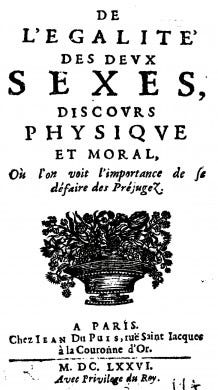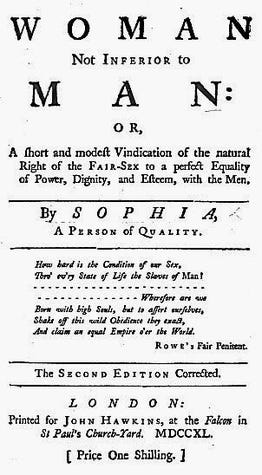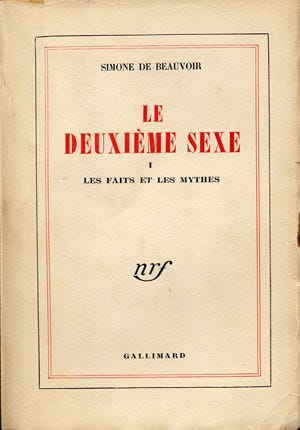The Surprising 17th Century Origins of Radical Feminism
 |
| Victoria Martínez -Jan 8, 2018 |
Almost 350 years after it was written, the feminist philosophy of François Poullain de la Barre still resonates on subjects like gender, prejudice, intersectionality, and the role of men in women’s fight for equality.
When French feminist Simone de Beauvoir wrote her groundbreaking book The Second Sex in 1949, she underpinned her argument that women as the “Other” was the result of men’s self-interest with the following epigram: “Everything that men have written about women should be viewed with suspicion, because they are both judge and party.”[1]
What is remarkable is that these were not only the words of a man, but of a man who produced some of the most radical feminist philosophy of the early modern period. A man whose three feminist treatises, published in the 17th century, served as the foundation for some of the most well-known names in the history of feminism, even as he himself has been largely overlooked outside academia. Perhaps most importantly, a man whose words still have much to teach us about feminism, intersectionality, and the deeply-entrenched prejudices that keep us from evolving.
“…both men and women tend to believe that their minds are as different as their bodies and that the distinctions that necessarily exist between them should be extended to all aspects of life. This opinion, however, like most of the ones we hold about custom and usage, is pure prejudice, and is dictated by superficial appearance rather than close analysis. We would certainly reject it if we took the trouble to go back to its origin.”
“As far as women’s present situation is concerned, we would have realized that it is simply the rule of the stronger that has put them in such a subservient position, and we would understand that it is not through any natural deficiencies that they have been denied the advantages enjoyed by our sex.”
– François Poullain de la Barre, “On the Equality of the Two Sexes,” 1673[2]

François Poullain de la Barre (1647–1725) published De l’égalité des deux sexes (On the Equality of the Two Sexes), the first of his three works of feminist philosophy[3], in France in 1673 against the backdrop of the four-centuries-long intellectual and literary debate known as La Querelle des Femmes (The Women’s Quarrel). The Querelleoriginated with the writings of Christine de Pizan — in particular, The Book of the City of Ladies, in 1405 — that launched a defense against misogynistic doctrine. The debate that took place over the following centuries was represented on the side of women mainly by educated women of the upper class. It was almost exclusively theoretical, mainly polemical, and existed primarily in writing or, by Poullain’s time, in the salons of the Ancien Régime.
Poullain[4] entered the conversation covering ground that had been well-trod. Some of what he wrote had already been written by others in so many words. Where he departed from the status quo was in his challenge of the social and political structures that engendered not just the oppression of women, but all inequality.
“Poulain… went beyond his predecessors by formulating his feminist argument as an integral part of a systematic, egalitarian social philosophy. Beyond the issue of gender, Poulain extended his critique of ‘prejudice’ to other fields, such as rank and race. In the preface to the Egalité he observed that male superiority was the oldest, most widespread and deeply ingrained prejudice of all; if that could be brought down, all other prejudices would become questionable too.”[5]
In this way, Poullain may very well have been among the first to argue for what we now refer to as intersectional feminism. Very much in the spirit of this modern movement, he railed against the “moderate and frivolous feminism in the seventeenth century coming out of the précieuse hotels and savante salons of the Marquis de Rambouillet, Mlle de Scudéry, and Mme de Sévigné.”[6]
It feels very appropriate, then, that this radical take on the “women’s question” came from a man whose personal history seems to indicate that he frequently felt uncomfortable existing in ideological “boxes.” In his lifetime, he went from studying as a theologian to becoming a Cartesian[7]philosopher, to being ordained a Catholic priest to ultimately renouncing Catholicism for Calvinism and a wife and family.
Not surprisingly, his feminist philosophy combined Cartesian rationalism with what seemed like a personal sense of disdain for blind acceptance of custom and tradition. He wrote with derision of how “if something is well established, then we think it must be right,” and that “It is incomparably more difficult to talk men out of the opinions they hold through prejudice than those they have embraced through the strength and conviction of reason.”[8]
The modern relevance of many of his statements demonstrate how little the cause of feminism has progressed over the last several hundred years.
“All laws seem to have been made to keep men in their present position of power. Men we regard as fonts of wisdom have never said anything good about women. In fact, men’s behavior towards women in all places and at all times is so uniform that it seems to be part of an organized movement.”
“Popular opinion about women is confirmed by the views of the learned. If the public pronouncements of those whose power rests on people’s credulity coincides — to women’s disadvantage — with general appearance, then it is no wonder that women have such a bad image in the minds of simple, uneducated people. As is so often the case, one prejudice is reinforced by another.”[9]
What should have been a bomb dropping on the debate turned out to be a dud, as few took notice of his work, and even fewer were ready to tackle the class system to which they belonged. In his own time and until relatively recently, Poullain and his philosophy have been largely overlooked in the history of feminism. But if imitation is indeed the highest form of flattery, then he was perhaps one of the most flattered men of the 18th century; a development that ensured that, although mostly uncredited, his feminist philosophy became an important part of what we continue to build on to this day.

While Poullain’s theory was occasionally cited by other writers and theorists, it wasn’t until 1739 that his work was embraced, though even that came with a hitch. That year, the pamphlet, Woman Not Inferior to Man, was published in London. Announced as a “short and modest Vindication of the natural Right of the FAIR-SEX to a perfect Equality of Power, Dignity, and Esteem, with the Men,” it was as feminist a proclamation as could be made today. Credited to “Sophia, A Person of Quality,” the anonymous writer had borrowed heavily from the translated work of Poullain[10]. The success of this derivative work brought Poullain’s philosophy into the feminist consciousness of the increasing number of British women theorists and writers who embraced and emulated him via “Sophia.”[11]
From Catherine Macaulay, who argued her feminist stance along similar lines to Poullain, to Mary Wollstonecraft, who was influenced by Macaulay and echoed Poullain’s arguments for women in all professions, radical British women of the 18th century embraced the egalitarian ideals in Poullain’s philosophy that, in an age of revolution, they now understood were the key to their cause. They and their sisters elsewhere in Europe and in the Americas became advocates for equality in a broader sense, including support for causes like the abolition of slavery, the treatment of indigenous peoples, and the causes and conditions of prostitution.
None of this is to say that Poullain “invented” the more radical feminism of the late early modern period, or that his philosophy served as the root of our modern feminist movement. Similarly, there’s no reason to think that he stands out in the discussion of feminism simply because he was a man arguing on behalf of women. Rather, Poullain and his philosophy represent an early and convincing argument for a feminism that focuses less on notions of gender constructs and more on setting aside the prejudices that maintain and reinforce inequality.

When Simone de Beauvoir quoted Poullain, she wasn’t doing so with a sense of irony. She and Poullain truly saw eye-to-eye on the principle that men were the cause of women’s inequality. The two were also alike in their rationalist thinking, favoring reason over prejudice, and recognizing that, as Poullain had written, “The mind has no sex.”[12] The rational and unprejudiced thinking of Poullain made the fact that he was a man irrelevant to Beauvoir. What was important was that he spoke to a truth when he wrote of his own sex:
“Women were judged in former times as they are today and with as little reason, so whatever men say about them should be suspect as they are both judges and defendants. Even if the charges brought against them are backed by the opinions of a thousand authors, the entire brief should be taken as a chronicle of trial and error.”[13]
In an age when intersectional feminism and male feminists are taking an increasingly central place in our conversations on equal rights for women, Poullain’s philosophy has immediate value. Even when we consider ourselves enlightened, we are all subject to prejudices that blind us to the reality of others and to outdated customs. No matter our sex, we can only begin to establish true equality if we consider carefully whether our long-held beliefs are based on reason or prejudice, and if they are rooted in the best interests of humanity or in the quest for power.
[1] Beauvoir, Simone de. The Second Sex. 1949. Trans. Constance Borde and Sheila Malovany-Chevallier. New York: Vintage Books, 2011. 30–1.
[2] Poullain de la Barre, François. On the Equality of the Two Sexes. Reprinted in François Poullain de la Barre: Three Cartesian Feminist Treatises. Ed. Marcelle Maistre Welch. Trans. Vivien Bosley. Chicago: The University of Chicago Press, 2002 (Electronic edition).
[3] De l’égalité des deux sexes: Discours physique et moral où l’on voit l’importance de se défaire des préjugés (On the Equality of the Two Sexes: A Physical and Moral Discourse Which Shows the Importance of Getting Rid of One’s Prejudices), 1673; De l’éducation des dames pour la conduite de l’esprit, dans les sciences et dans les moeurs: Entretiens (On the Education of Ladies for Training the Mind in the Sciences and Moral Judgement), 1674; De l’excellence des hommes, contre l’égalité des sexes (On the Excellence of Men: Against the Equality of the Sexes), 1675 [Note: the title of the last treatise was meant to be ironic].
[4] Also spelled Poulain (both spellings are correct).
[5] Akkerman, Tjitske and Siep Stuurman, eds., Perspectives on Feminist Political Thought in European History: From the Middle Ages to the Present. London: Routledge, 1998, 76.
[6] Seidel, Michael A. “Poulain De La Barre’s The Woman as Good as the Man.” Journal of the History of Ideas, 35,3 (1974), 500.
[7] Cartesian philosophy is based on the writings of René Descartes.
[8] Poullain de la Barre, On the Equality of the Two Sexes
[9] ibid
[10] Specifically, the 1677 translation, The Woman as Good as the Man: Or, The Equality of Both Sexes, attributed to “A.L.”, of de la Barre’s first treatise, De l‘Égalité des Deux Sexes (1673).
[11] Woman Not Interior to Man (1739) by “Sophia” was followed in 1740 by Women’s Superior Excellence over Man, and the two works were reprinted together in 1751 as Beauty’s Triumph. Another anonymous work, Female Rights Vindicated, published in 1758, was also derivative of Poullain’s first treatise. Like the work of Sophia, this was also subsequently republished, first in 1780 as Female Restoration and again in 1833 as Female Rights Vindicated.
[12] Poullain de la Barre, On the Equality of the Two Sexes
[13] ibid
Originally published at abitofhistoryblog.wordpress.com on January 8, 2018.


